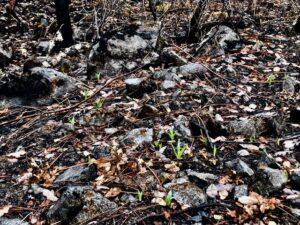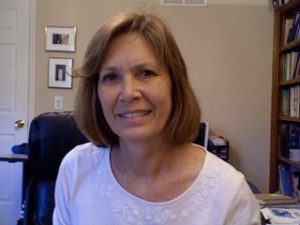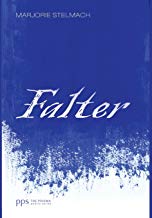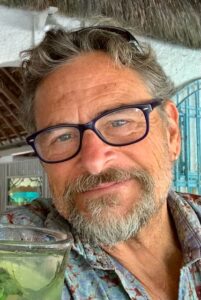
New Year’s Day, 2021. Clean air pushes the cold through my hair. A big grey sky opens above, spilling winter light. It is this exact light New Year’s is always meant to have. We head south, my dogs and I, skirting the melted wreckage of our metal barn, passing through our burned orchard and fences into a stark black fire scar that runs nearly straight for two miles, stopping abruptly, and fortunately, at a wide road. The scar’s about a half mile wide. The landscape, once so dense and bristly it was almost impenetrable, has been stripped of everything green: the coffeeberry, the deer brush, the poison oak, blackberries, grapevines, grasses, wildflowers–all gone. Contorted black trunks indicate manzanita and oak skeletons, left naked by a fire so hot it charred even the soil as far as the eye can see. Eighty foot evergreens, black from root to crown; not a living needle left. After the fire in August, smoldering hotspots lingered for a week or more, burning ragged stumps. Peering in, I see perfect molds of the roots which once anchored massive trees, now utterly missing, not even visible ash. They tunnel down into the earth six feet or more, contorted, determined, ambitious, but empty.
Revealed to me for the first time by the forest fire, the landscape feels both brand new and entirely alien. Nothing is any longer hidden. Everywhere the same dead strangeness, as if this space on earth has been abandoned. Long tracts of forest, denuded by the heat, no longer block the light but open up, instead, to a leafless arid landscape, steeper and rougher than I supposed. Burned rock outcroppings thrust from the black slopes. Silent monochromatic hills, previously unseen, now offer long views to distant blue ridges. Over many years, seasonal waterways carved deep gullies at the base of these slopes. Miners worked them all, long decades ago, lifting rocks out of the water one by one to get to the sand beneath where gold dust lingered. Or so they hoped. Hundreds of thousands of these small boulders, the size of grapefruits, loaves of bread, or sometimes basketballs, form mounds that bend to the curves of the waterways, raising the banks ten or fifteen feet above the stream bed. Sinewy miles of stones, all stacked by anonymous dreamers, like the burial cairns of a thousand Celtic kings. Until the forest fire, they were invisible. One hundred years of soil and forest duff had sifted down into the gaps between the stones. Vibrant tangles of willow, grape and honeysuckle once clustered thick along the banks of the creeks and streams, obscuring their contours. Now the banks are barren. The rock mounds are black and lifeless. Even the streams look burned.
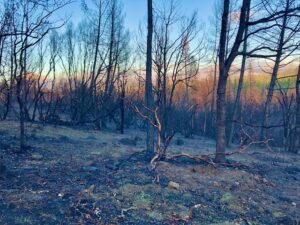
Animals are scarce out here. From time to time, chainsaws buzz distantly, but otherwise the only sound is the soft, persistent rattle of woodpeckers pestering the fire-loosened bark. Bare dirt game paths still cut across the land, exactly the width of deer or coyote, but no prints, no evidence of passing. They go nowhere, come from nowhere, make no sense. If I stand, here, on this spot, I am the wheel hub of a thousand nascent paths, all beckoning equally, and equally all brand new. Nothing stops me from veering right or left, from skirting the edge of old cattle roads or wandering through occasional patches where dead trunks and branches still weave scratchy feeble nets. So long as I remain in the burned zone, it matters little which direction I go. In truth, I am not going anywhere.
The forest fire gave birth to an empty dead land. Each time I step into it, I feel as if a portal opens, invisibly. I walk through without even knowing I’ve done so, but a momentous shift takes place, the green world quickly fades, and I’m enfolded into this uncanny wilderness. The mystery draws me in. I’ve wandered the charred moonscape for months, ensnared in a dream of apocalypse, but haven’t met a single soul. Sometimes I imagine myself entirely alone forever, yet even this doesn’t diminish my giddy sense of discovery. I’m the last human to see these trees, I think. I make the last footsteps ever seen in this enchanted primeval earth. Questions abound. Is the world broken? Are cities burning? Will I walk for weeks in somber amazement?
If this was an essay about renewal, about hope, I might mention the tentative flecks and swirls of green new growth appearing. The stubborn multi-trunked oaks, burned to charcoal, nonetheless push spears of armored leaves out from impossible roots. So do the coffeeberry shrubs; for now just thin burnt sticks, 7 feet tall, yet already with a nest of blue grey leaves in the center. How long until these jumbled mats of dogged vitality produce the red, then purple, then black berries for which they’ve earned their name? Tiny grasses have started to fuzz this hillside or that ravine while leaving another barren, as if cast by an inexpert sower. The native iris, purple-flecked star of the summer, has slipped out of the soil early. Eager shoots of otherwise deciduous poison oak, blackberry, and wild rose poke up every so often, defying winter and the fire both. Vast stretches of dead soil stretch out for hundreds of feet, undisturbed by any signs of life whatsoever, until, out of the black ash, one single soap root lily emerges, just an inch or so, several fleshy points weirdly cheerful. Will its spindly flower stalk emerge now, months early? Ten years it takes this plant to produce a flower from seed. Has it been set back a decade, or triggered into reproductive panic?
All of these tiny slips of green might, in such an essay, arrive triumphantly, vibrant nature’s avant garde, symbols of life’s eternally regenerative capacities, an analogy for our times. It’s New Year’s Day, after all, and Janus rules, one black face meditatively studying the troubled past, the other, green, scanning the future for all of it’s possible ripeness. It’s an apt day for such an essay. The air does feel more alive than usual. The year we’ve all finished seems forever damaged, flames of landscape, hatred, and disease still smoldering. The year ahead, just 7 hours old, has perfect newborn skin.
And it’d be an easy essay to write. Waxing poetical, rhapsodic. Waves of green cascading over the dark hills, bringing spring and flowers and unbridled joy. Gradual rebirth for the damaged earth. The green and black working together, each competing with equal fervor, each winning, each assisting the other. What a metaphor for the world, and our troubled time on it. It’d be a small spiritual breakfast of an essay, interweaving and tying together diverse thoughts, revealing something new at the end. Hopeful but fragile, like a butterfly’s wing. Redemptive.
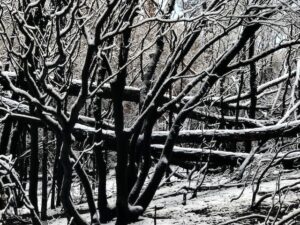
But it’s not that essay. In fact, though I know I’m not supposed to say this, I’m a little irritated by the plants. More than a little. Their greenness invades my fine and private place. The eager little lily seems awkward and out of place, not brave. Dark artful oak and manzanita trunks, vital to my sensation of otherness, will soon enough disappear into a dense unpleasant mess forever obscuring their sculptural beauty. Native grape vines, which sound like some delightful thing everyone should have, will sprout in all directions, wrapping one tree after another in a 50 foot tall curtain of vegetative excess. With rubbery trunks as thick as a bicep, they’ll mound up along the stream, collaborate with steroidal poison oak, form tangled hummocks through which only foxes can fit. To be brutally honest, I hate the return of the invasive blackberries, one growing season away from throwing forth 15-foot-long canes covered with huge painful spines protecting mostly inedible fruit.
Of course the inhospitable native shrubs will return, and my ruined land, this pathless empty scape, with its dramatic interplay between previously unseen gullies and ridges; all of this newness will be once again absorbed into ordinary dust and fade into a somewhat suspect memory. Remember after the fire – wasn’t there a creek here somewhere? A quartz outcropping? Soon the door, kicked open by blind fire, will close, and the dreamscape to which it led will once more be locked away forever.
But for a little while, I yet have the freedom to stroll and wonder, to discover, to marvel, to stop and hold my breath, to be startled by odd beauty into particular truth: this world I see before me, laid out in black ash and blacker heartwood, has never been seen before. I am the first.
